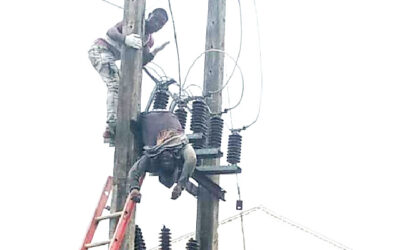Weak Facilities and Recurrent Jailbreaks in Nigeria

The frequency in the reported cases of jailbreaks in Nigeria shows that there are loopholes being exploited by hardened criminals in the administrative system of the Nigerian Correctional Services (NCS). What are these gaps?
***
The phenomenon of jailbreaks in the Nigerian Correctional Services (NCS) is posing dangerous threats to national peace and security.
The Nigeria’s Prisons Service is a government agency situated under the Ministry of Interior, and has the power according to Section 10 of the Act, in taking into custody all persons legally interned; providing safe, secure and humane custody for inmates; conveying remand persons to and from courts the motorised formations; identifying the existence and causes of most of the anti-social behaviours of prisoners; conducting risk and needs assessment, aimed at developing appropriate correctional treatment methods for reformation, rehabilitation and reintegration.
Also, the Service is implementing reformation and rehabilitation programmes to enhance the reintegration of inmates back to the society; initiating their (inmates) behaviours modification by providing the medical, psychological, spiritual and counselling services for all offenders, including violent extremists.
Additionally, it is empowering inmates through the deployment of educational and vocational skills training programmes, and facilitating incentives and income generation through custodial centres, farms and industries; administering borstal and related institutions, providing support to facilitate the speedy disposal of cases of persons awaiting trials and administer prisons farms and industries for this particular purpose, and in the process generate revenue for the government.
There are currently 240 correctional facilities in Nigeria and the official capacity of the centres is put at 50, 1530 inmates.
For the past two decades now, however, the Nigerian Correctional Centres across the states have witnessed one form of jailbreak or the other by unknown gunmen, terrorists, armed robbers, and assailants, with the main purpose of freeing some of their convicted or incarcerated cohorts in crime.
Various jailbreaks have taken place at the prisons in Kogi, Ekiti, Ondo, Minna, Bauchi, Damaturu, Owerri, Edo, Lagos, Oyo, among others in Nigeria.
The Nigerian Correctional Centres are usually overcrowded with condemned, dying and awaiting trial inmates, while a number of cells are allegedly kept for some wealthy inmates who usually serve out their terms in “pleasure”. And all of these indicate some of the reasons why the ‘unfavoured’ inmates go aggressive to ensure they escape from the prison at all cost.
Ineffective Correctional Service Arms Squad and Intelligence Unit, lack of prison intelligence and dynamic security, among others, have weakened the Nigerian Correctional facilities’ security and led to incessant jailbreaks in Nigeria.
Read Also: 9% Of Nigerian Graduates Find Employment: Why Are Nigerian Youths Not Employable?
Observations have been made that numerous illicit items or objects are smuggled into prisons during the various social visits astheir visitors are not being thoroughly screened prior to such visits.
There is lack of criminal intelligence as such measures would have been helpful in identifying the chance of escape by a prisoner, and so move the prisoner to a more secure institution, with their classification changed or additional measures put in place to manage the risk.
International trends have, however, revealed that criminal networks usually continue to exist within correctional centres as criminals make contacts while in prison and, in some cases, extend their criminality beyond the prison system.
Jailbreaks that occur in the Nigerian correctional facilities have been attributed to corruption among the officers of the Service, poor quality and quantity of prison food being served to the inmates, poor economy of the country, overcrowded facilities, lack of medical facilities and personnel, poor sanitation and incessant death among inmates, respectively.
One of the significant reasons behind the increasing jailbreaks in Nigeria is due to the proliferation of firearms, economic and social crisis as well as the dynamic security strategies that are supposed to be in conformity with global practices.
In the same vein, many inmates jailed for serious offences like armed robbery, kidnapping, murder, drug abuse, human trafficking, among others, are not put under critical surveillance and the corrections officers in charge do not relate with them professionally in a manner that would make the inmates feel remorseful of criminal acts.
Almost all the state governments are reportedly said to have developed the phobia of not signing the death warrants of condemned prisoners in their various states or to convert their death sentences to life imprisonment. And so the government continues to waste revenue on condemned prisoners whose hope for freedom only lies on a jailbreak.
A handful of such jailbreaks took place last year as well, with many raising the alarm about the safety of detention facilities in Nigeria. Agodi Minimum Security Prison located at Agodi area in Ibadan, Oyo State was attacked on 11 September, 2007 and the Ekiti jailbreak happened on November 30, 2014.
A third jailbreak occurred in Nigeria this year, leading to the escape of several inmates. Since 2017 to July this year, at least 4,307 inmates have escaped from prisons.
In 2021 alone, more than 2,000 inmates were freed in two jailbreaks; on September 13 about 240 inmates were freed after gunmen attacked a detention facility with explosives in North-Central Kogi State, and on April 5 at least 1,800 inmates were freed in the South-east Imo State in April 2021 when another facility was also blown up with explosives.
The latest jailbreak occurred at a correctional facility in Abolongo area of Oyo, Oyo State, which was attacked by gunmen with grenades in order to gain access and set the prisoners free.
A renowned security expert, Chief Ojo Oladele, has identified some reasons for the frequent occurrences, noting that the slow pace of Nigeria’s judicial system in the dispensation of justice has constituted a major setback as some innocent suspects are mixed together with hardened criminals while awaiting trial for months.
Oladele explained that anytime there is an arrest of a gang leader during an operation, and if there was no summary death, there would always be an attempt by his members to regroup, fully armed to rescue him on the premises of the court where he is standing trial or they would forcibly break into the custodial facility to set him free.
The security expert also attributed jailbreaks to overcrowding of inmates, negligence or connivance of custodial officials, poor feeding and inadequate amenities facilities at the centres.
He alleged that some top government officials have a hand in sponsoring jailbreak, especially if they needed the services of a notorious criminal during election periods.
In Edo State, the desperation of inmates to exit from correctional centres has been given as the major reason for jailbreaks, according to a medical doctor, Dr Bright Oniovokukor.
The medical doctor said correctional centres are not a place of luxury or relaxation, but rather custodial facilities for holding people who have demonstrated some level of anti-social conducts.
He lamented the frequent loss of security operatives as a result of jailbreak, adding that the poor nature of security equipment in the custodial facilities puts the operatives at risk.
“If there are CCTV cameras in the centres, the risk that personnel are exposed to would be reduced and it may also check the frequency of jailbreaks and the attendant risk.
“Majority of the correctional centres are old, too small and not clean in terms of hygiene. The dilapidated nature remains a potential risk for jailbreaks occurring. It is assumed that those in the correctional centres do not have any human right once they get into jail,” he said.
Oniovokukor opined that most custodial facilities were built in the colonial era or immediately after independence, adding that the government has not built new prisons because it sees custodial facilities as punishment ground for those who may have committed one offence or the other.
“The government may not have deemed it fit for that due to lack of political will. Government officials and politicians who have had a feel of it are beginning to think twice about the state of the facilities,” he said.
In his comment, John Oluka, a journalist, said the people themselves do not believe that the building of about 10 correctional centres is an achievement on the side of the government because nobody will applaud them.
“Some of the correctional centres are overcrowded as they continue to rely on the old ones and do not build new ones. People who are remanded for minor offences and those who have not fulfilled their bail conditions are mixed up with hardened criminals who brainwash them with some of their antics in perpetuating crimes.
“These correctional service centres should not be on the Exclusive List of the government, but on the Residual List so that the state governments could also build such facilities in their various states,” Oluka said.
Security experts have recommended putting in place a very sensitive nature of prison information and intelligence; establishing a prison intelligence management board; adopting a multi-agency approach security strategy; and training of prison-based intelligence officers for intelligence gathering and information sharing as strategies of curtailing the rising spate of jailbreaks in Nigeria.
They highlighted that in order to ensure that the correctional service authorities identify these activities, all prison facilities should have in place a structured prison intelligence system to enable security and related information to be collected by all prisons’ staff members and evaluated in a very secure environment, consistent with national legislation.
According to them, this would enable them to meet security and intelligence objectives and pass this information to the security department.
According to the experts, the concept of dynamic security in prisons actually goes beyond the physical barriers to prevent escape but depends on an alert staff who usually interact with prisoners, who have an awareness of what is going on in the prison and who ensures that prisoners are kept active in a positive way.
The fundamental aspect of correctional centres security management, they said should include the provision of physical aids to security such as locks, cameras, alarm systems (internal and external), X-ray machines, metal detectors, radios, handcuffs, among others.
Read Also: Repentant Insurgents and Boko Haram Terrorists: Should We Kill Them?
They posited most Nigerian correctional centres have only one fence that could be pulled down, and so recommended that the specification for perimeter security, for instance, may include an outer concrete wall, and an inner prison mesh type fence with method of construction adequately specified, along with the distance between the wall and fence, the type and location of perimeter lighting, perimeter alarm system and a CCTV system to trigger the cameras when a perimeter alarm is activated.
A legal practitioner, Ngozi Morka noted that the Nigerian justice system grinds slowly resulting in congestion of cases as well as the correctional centres.
Morka urged judges to expedite action on the dispensation of justice to reduce congestion and halt all the delay tactics deployed by some legal officers to frustrate criminal matters.
He also canvassed for mass recruitment of custodial officials across the country as they have short supply of staff, and also offer training and retraining of officials with necessary tools and equipment.
He urged the government to provide every correctional centre with enough educational, skill acquisition centres so that the inmates would learn one trade or the other and become better citizens after serving their jail terms, stressing that the correctional centres should be reformatory and not punitive.
The effect of jailbreak on society, according to another security expert, Jude Awe, is that it creates fear among the people, adding that when jailbreak occurs, the success emboldens criminals and causes rise in criminalities.


